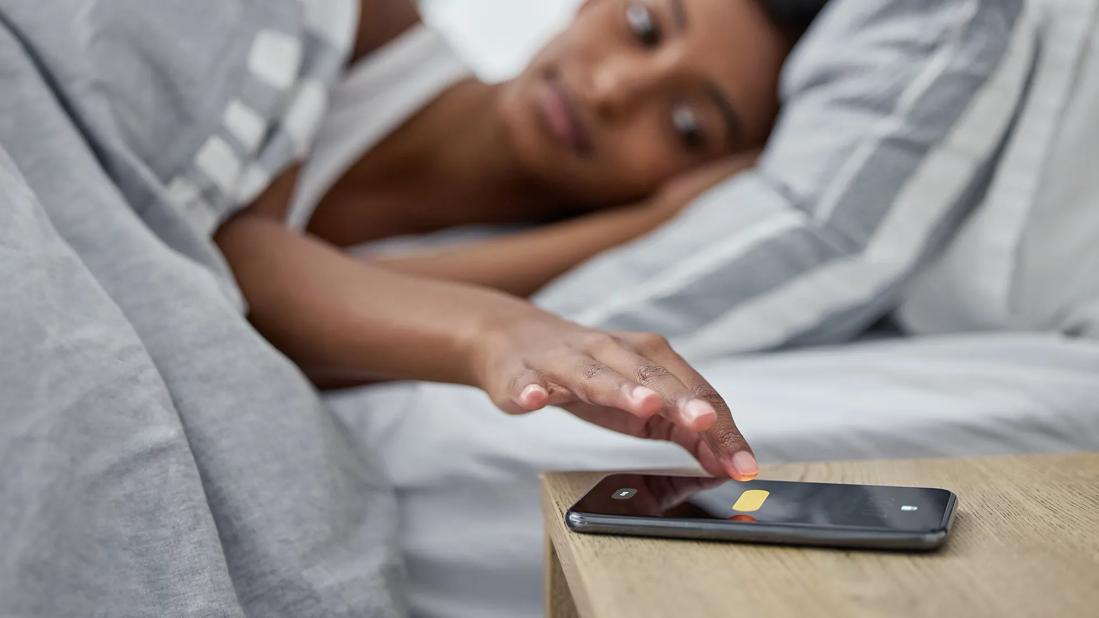New research may shed some light on the debated topic

You stayed up a wee bit too late (again) binge-watching Yellowstone. Or perhaps your 18-month-old was crying at 2 a.m. … and again at 3:45 a.m. Whatever the reason, there are times when hitting that snooze button is awfully tempting.
Advertisement
Cleveland Clinic is a non-profit academic medical center. Advertising on our site helps support our mission. We do not endorse non-Cleveland Clinic products or services. Policy
There’s a good chance you’ve heard that the snooze button is bad for you and getting quality sleep.
But new research has been receiving a lot of attention for suggesting snoozing that alarm may not have that much of an impact on sleep quality.
So, is snoozing bad for you?
As with many situations in life, the answer isn’t so straightforward, says behavioral sleep medicine psychologist Alicia Roth, PhD. Dr. Roth discusses what this new research shows.
Dr. Roth says that a sleep routine that works for one person may not work as well for others.
So, what does this newer research show?
She adds that it’s important to note that these are preliminary studies with a low sample size.
“That makes it hard to generalize what’s right for everyone,” Dr. Roth stresses. “What we suggest clinically in the real world is to try to minimize snoozing. The research may show that it doesn’t hurt people, but it certainly doesn’t help.”
Advertisement
One thing to consider with using the snooze button is that it may not help your body get the restorative sleep you need.
“Much of the latter part of our sleep cycle is comprised of REM sleep, or dream sleep, which is a restorative sleep state,” Dr. Roth explains. “And so, if you’re hitting snooze, then you’re disrupting that REM sleep.”
We all have different arousal thresholds during different stages of sleep, and if we’re disrupting late-stage REM sleep, it can cause a “fight-or-flight” response, which increases our blood pressure and heartbeat.
In fact, many people mistakenly think they can operate on fewer than seven hours of sleep per night. But research shows that over time, insufficient sleep contributes to weight gain, cardiovascular risk and even death.
Another consideration? While some people can get conditioned to hitting snooze and actually get used to it, Dr. Roth says if a person feels the need to do so again and again, it could be an indicator that they’re either not getting enough sleep or they might have an underlying sleep disorder such as obstructive sleep apnea or chronic insomnia.
When it comes to snoozing, healthcare professionals can’t make a blanket statement or offers absolute truths. For some of us, snoozing may work.
So, if you tend to hit snooze and feel fine, then Dr. Roth says there’s really no need to change your habits.
But if you find yourself hitting snooze every day and feel like you’re not getting quality sleep, she says then it’s time to look at your sleep habits.
“The evidence is clearer on the cons of snoozing, especially those for sleep who have sleep disorders,” emphasizes Dr. Roth.
Advertisement

Sign up for our Health Essentials emails for expert guidance on nutrition, fitness, sleep, skin care and more.
Learn more about our editorial process.
Advertisement

To avoid sleep deprivation and shift work sleep disorder, try adopting habits that minimize light exposure and prioritize daytime sleep

Sleep disorders, mental health conditions and other health concerns can all affect the quality of your sleep

Most people fall asleep within 10 to 20 minutes, but if your experience is different, adjusting your sleep schedule may help

Stick to a consistent schedule, be mindful of screen time and work on reducing your stress levels before bed

Napping can boost focus, memory and mood — if you time it right
These devices can help shed light on what’s happening with your body during rest

Keep a dream journal, set your intentions before bed and make sure you’re getting a full night of high-quality sleep

Controlling your dreams may help you tap into your creativity and even reduce anxiety

Even small moments of time outdoors can help reduce stress, boost mood and restore a sense of calm

A correct prescription helps your eyes see clearly — but as natural changes occur, you may need stronger or different eyeglasses

Both are medical emergencies, but they are very distinct events with different causes